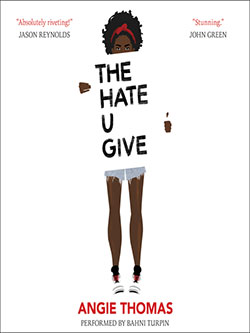 This past weekend, Darling Daughter and I participated in a parent-teen book discussion about The Hate You Give by Angie Thomas. This book has won many awards, received fantastic reviews, and is a hot topic of discussion in both the book and teen world — especially where those worlds overlap. It’s about the aftermath of a police shooting of an unarmed black teen. It covers various racial issues, grief, friendship, economic disparity, and political activism, just to name a few of the challenging thematic elements.
This past weekend, Darling Daughter and I participated in a parent-teen book discussion about The Hate You Give by Angie Thomas. This book has won many awards, received fantastic reviews, and is a hot topic of discussion in both the book and teen world — especially where those worlds overlap. It’s about the aftermath of a police shooting of an unarmed black teen. It covers various racial issues, grief, friendship, economic disparity, and political activism, just to name a few of the challenging thematic elements.
The conversation over pizza and salad was excellent. I came with a list of questions, but we really didn’t need it. We wondered together about all we don’t know and can’t know about another person’s situation. We wondered if differences make it harder to understand one another…and/or if there’s a way to use those differences somehow to strengthen what we have in common. We reflected on how complicated life can be — how so many traps can catch a kid, an adult, too. We talked about the difference one caring adult, or one good friend, can make in a kid’s life. And we talked about when that isn’t enough. We discussed institutional and systemic racism. And they provided real life illustrations from school that week.
It was pretty eye opening. These teens are white students at very diverse urban high schools (three different ones.) We parents had gone to high schools, back in the day, without nearly as much diversity in terms of culture, language, skin color, religion, and socio-economic status. It was clear they thought we’d missed out. Speaking for myself, I think we did, too.
Our kids are pretty fluent in things we never thought about as high school students because of the rich make-up of their student bodies. Their lunchrooms accommodate an array of dietary restrictions and economic necessities. The scheduling of tests has to take into account various religious observances. There are sometimes heated discussions and even fights happening in languages the bystanders and staff don’t understand. There are cultural values they find mysterious, but want to respect, even as they wonder about the source of their own values. There are racial issues that play out in both ugly and interesting ways. It’s quite a mix of people and issues they navigate each day in their classes, hallways, and lunchroom.
Our kids loved The Hate You Give—for the “realness” of it, the contemporary feel, for what it helped explain, and for the questions it made them ask of themselves, their schools, and their communities. When we talked about “mirrors and windows” — whether a book mirrors a reader’s life situation or provides a window to see into another’s life situation — they all said they thought this was a window book. It was written for white people, they said, to help them flesh out stories in the news, help them build empathy. I asked if they had black friends reading the book. They did. They did not speculate as to whether their black friends read The Hate You Give as a mirror or window book, but they said everyone who reads it is talking about it.
We parents loved The Hate You Give, too — for the peek inside our kids’ days and thoughts, for explanations of things we’re not familiar with (like rap lyrics), and for its complexity. The situations and the characters in this book are enormously complicated. Our days are filled with tweets and posts and headlines that grossly simplify things, thereby causing further harm. This books blows open issues of race and family and community by showing their complexity. It makes for a rich, heart-breaking story that somehow manages to give a glimmer of hope at the end.
The Hate You Give is a heck of a cross-over book. Some of us read YA and kidlit books regularly, but many adults do not. This one works for adults. And if you have a teen you can read it with — well, sit back and listen to them. They also give you a sense of hope.
SaveSave
SaveSave
SaveSave
